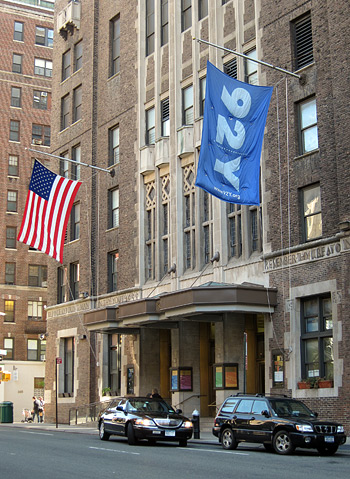Big Red strengthens ties with Big Apple's 92nd Street Y

The 92nd Street Y in New York City. Photo by Scott Beale/Laughing Squid.
New Yorkers of all stripes have long known the 92nd Street Y as a gathering place for arts and culture, Jewish life and education, health and fitness, personal growth and travel, classes for adults, children and families, and a strong sense of community.
The nonprofit organization is also quickly becoming a place to go for lectures and discussions featuring top Cornell faculty and the latest thinking in fields from astronomy to philosophy and beyond.
With five faculty members slated to give lectures there in the coming months, this year marks the beginning of closer ties between the two institutions.
Cornellians have been involved with the Y (which was founded in 1874 as the Young Men's Hebrew Association) as members or guest speakers in the past, says Brenda Tobias, Cornell's director of New York City communications. But by creating a stronger, broader presence, the university is building new bridges between Cornell in Ithaca and New York -- and sharing Cornell's greatest thinkers with the New York community.
"It's a wonderful opportunity," Tobias says. "The 92nd Street Y is a landmark cultural institution, and an ideal partner for Cornell."
And for the Y, which serves 300,000 people annually, Cornell is a growing resource for compelling and thought-provoking speakers.
"92nd Street Y has been working with Cornell ever since we began our science talks, and it's always been a rewarding relationship," says Helen Conover, who programs the "First Class: Science" talks at the Y -- just one of the many program series that are offered. "With its depth in science and agriculture, Cornell is a perfect source for speakers and information ... We're delighted to share Cornell's wide range of experts with New York City audiences."
This spring and summer's speakers and topics are:
- Kathryn Gleason, professor of archaeology and landscape architecture, on archaeology in Israel and Herod the Great (March 23);
- Barry Strauss, professor of history, on Spartacus and ancient Rome (March 28);
- Karen Bennett, professor of philosophy, on how philosophers think about the meaning of life (March 30);
- Glenn Altschuler, professor of American studies, on celebrity, connectivity and the end of communication in America (May 17); and
- Thomas Hockett, professor of law, on the life of Thomas Jefferson (June 2).
All lectures will be in the evening and are open to the public, with tickets between $25 and $29 and a typical audience size of about 100 people. And stay tuned for additional lectures in the fall, Tobias says.
"It's all about being a part of the New York community and expanding the opportunities for our faculty beyond the classroom," she says. "And they love doing this. I've never heard of anybody not having a great time."
Links: